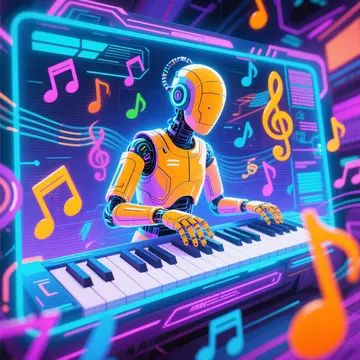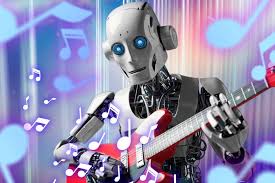Let’s face it—AI music is taking over your favorite streaming platforms, and it’s happening fast. From Spotify and Apple Music to YouTube and Deezer, more AI-generated songs are slipping into your playlists, radio mixes, and recommendations than ever before.
Some users don’t mind. Others are downright frustrated.
Whether it’s synthetic vocals that feel soulless, repetitive background instrumentals that lack originality, or the sudden disappearance of human touch in songwriting, the AI music wave is hard to ignore.
If you’re in the second camp—someone who wants real, artist-created music—you’re not alone. The good news? You don’t need to quit streaming entirely.
In this guide, we’ll explore why AI music is spreading so quickly and offer three practical ways to avoid it while still enjoying your music apps.

Why Is AI Music Suddenly Everywhere?
The short answer? Scale and cost.
AI tools like Suno, Udio, and Boomy allow creators to generate entire songs in seconds, sometimes without any musical background. For example, Boomy users have already released over 14 million AI-generated tracks—many of which are live on Spotify, Apple Music, and Amazon Music.
These tracks are often:
Royalty-free
Cheap (or free) to license
Easy to produce at volume
Streaming platforms are motivated by algorithmic engagement and lower royalty payouts, so AI music slips in easily. Combine that with TikTok trends, AI-driven background playlists, and new artist profiles powered entirely by synthetic voices—and it’s easy to see how AI music is taking over your streaming life.
1. Use Human-Curated Playlists to Stay Grounded
One of the best ways to avoid AI-generated music is to lean into human-curated content—playlists made by real people, not algorithms.
Where to Find Them:
Spotify’s Editorial Playlists – Look for ones tagged “Curated by Spotify” (like Lorem, Fresh Finds, Pollen). These are built by real editors, not AI.
Apple Music’s “Essentials” Collections – These are handpicked based on artist discographies.
Deezer’s “Editors’ Picks” – Deezer actively labels its human-curated playlists.
Tidal’s “Verified Playlists” – These often highlight independent and emerging artists with genuine production credits.
Avoid generic playlists with names like “Chill Background Vibes” or “Focus Flow”—these are often AI-generated or AI-influenced compilations with minimal human review.
Pro tip: Follow music blogs or niche curators on social platforms (like @indieshuffle or @albumism). Many of them publish Spotify or Apple Music links to hand-curated gems.
2. Use Third-Party Tools to Filter AI Music
Several browser extensions and databases now help identify or exclude AI-generated tracks—especially useful on platforms like Spotify and YouTube.
Recommended Tools:
SpotiFake (Chrome extension) – Detects suspiciously repetitive or AI-generated music in Spotify playlists.
WhoSampled – While built for sample tracking, it often shows whether a song has real production credits.
Genius.com – Use lyric annotations to check artist background. Real artists = real stories.
MusicLM Detector (experimental) – A research tool still in beta, it flags songs suspected of being AI-generated using metadata analysis.
Though no tool is 100% accurate yet, these can give you helpful clues, especially when you see an unknown artist with 500,000 monthly listeners and zero social presence.
3. Support Independent Artists on Verified Platforms
Another effective way to avoid AI-generated music is by actively supporting verified human creators.
Platforms to Explore:
Bandcamp – Most music here is uploaded directly by independent artists. Zero AI spam.
SoundCloud Verified Accounts – Focus on artists with active comments, bios, and social links.
Tidal Rising – Highlights real artists early in their careers, often before major label deals.
Substack Music Newsletters – Subscribe to writers who share handpicked artist spotlights.
If you love niche genres (lo-fi hip hop, synthwave, ambient pop), there are vibrant indie communities on Reddit, Discord, and even TikTok where you can discover 100% human-produced music.
It’s all about intentional listening: choosing where your music comes from instead of letting algorithms spoon-feed you generic vibes.
Why This Matters: The Human Element in Music
Music is more than audio—it’s culture, storytelling, and human connection. The rise of AI music raises big questions:
Who gets paid when music is generated instantly?
Will AI playlists push out real musicians?
What does it mean to feel something from a song if no one wrote it from experience?
According to a 2025 survey by MusicWatch, 62% of active streamers said they “prefer music made by real people” over AI-generated content. That emotional connection still matters.
Avoiding AI music isn’t about fear—it’s about choice. And right now, you still have that choice if you know where to look.
FAQs: Avoiding AI-Generated Music
Q1: Can I completely filter out AI music on Spotify or Apple Music?
Unfortunately, no. There's no official filter yet, but using curated playlists or third-party tools can help.
Q2: Are there AI music tags or labels on songs?
Some songs are labeled, especially those created via Boomy or Udio. But most are not transparently tagged, which is why tools and manual checks are important.
Q3: What are signs a track might be AI-generated?
Repetitive lyrics, lack of detailed artist bios, no tour history, and robotic vocals are common signs.
Q4: Is AI music always bad?
Not necessarily. Some creators use AI as a tool, not a replacement. But mass-uploaded, low-quality tracks are a problem.
Q5: Will streaming platforms add AI filters in the future?
Possibly. As consumer demand grows for transparency, companies may add labeling features or filters for human vs AI content.
Final Thoughts: Choose Your Listening Future
AI music is taking over your favorite streaming platforms—but you don’t have to let it take over your playlists. With a little awareness and effort, you can reclaim your listening experience.
Follow human curators. Use smart tools. Explore indie scenes. And remember that behind every great song is a real story—and often, a real struggle.
That’s the kind of music worth hearing.
Learn more about AI MUSIC








